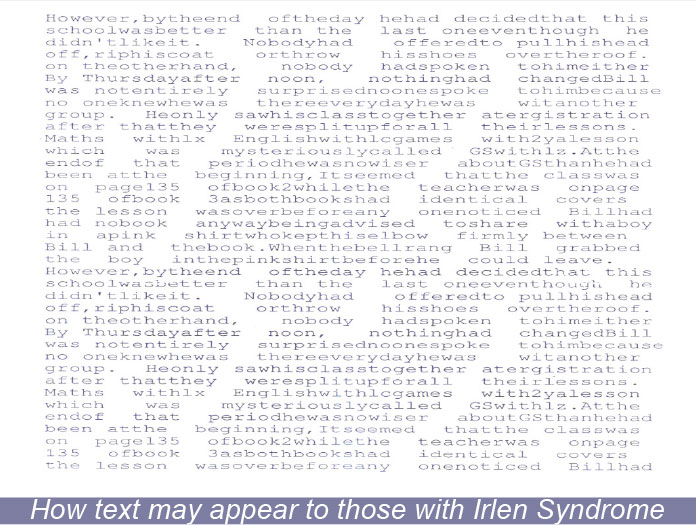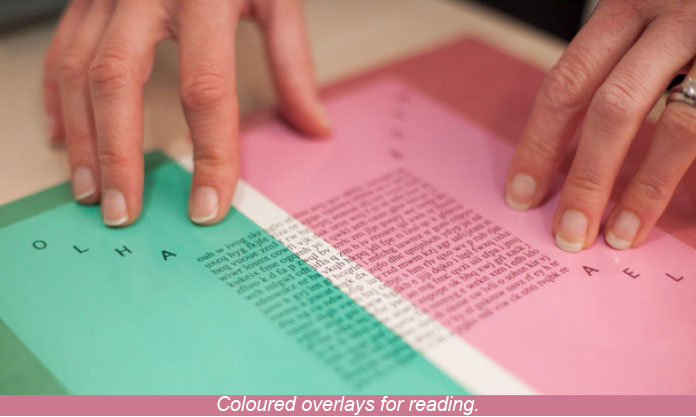Board-Certified Behaviour Analyst, Fifi Kiwan, sheds a light on Irlen Syndrome and how it impacts visual processing and reading challenges.
Irlen Syndrome, also known as Scotopic Sensitivity Syndrome, is a condition that affects how individuals process visual information. Discovered by Helen Irlen in the 1980s, this syndrome often goes unrecognised, leading to significant challenges for those who experience it. It can profoundly impact both children and adults, particularly in areas involving reading and visual tasks.
What is Irlen Syndrome?
Individuals with Irlen Syndrome often report symptoms such as light sensitivity, headaches, eye strain and difficulty with reading. These challenges stem from the brain’s inability to process certain wavelengths of light effectively. As a result, reading can become a frustrating and exhausting task. For many, black text on a white background may appear to shimmer or blur, making it difficult to focus on the words.
Visual Processing and Reading Challenges
The effects of Irlen Syndrome can be particularly pronounced in educational settings. Children may struggle to keep up with their peers due to difficulties in reading fluency and comprehension. The visual distortions can lead to misreading words, skipping lines or losing your place on the page. Consequently, this can result in lower academic performance, decreased self-esteem and a reluctance to engage in reading activities.
Adults, too, can experience significant challenges in their professional and personal lives. Tasks that require prolonged visual attention, such as reading reports or using screens, can lead to fatigue and frustration. This chronic discomfort may lead some individuals to avoid situations that require reading, further isolating them from opportunities for growth and learning.
Diagnosis and Treatment
Diagnosing Irlen Syndrome can be complex, as it often overlaps with other conditions such as dyslexia or ADHD. A comprehensive assessment typically involves identifying symptoms and evaluating how they impact daily activities.
 Optometrists or specialists trained in Irlen Syndrome can conduct vision tests and provide insight into the specific visual processing challenges faced by the individual.
Optometrists or specialists trained in Irlen Syndrome can conduct vision tests and provide insight into the specific visual processing challenges faced by the individual.
The most common treatment involves the use of coloured overlays or tinted lenses. These modifications can help filter light wavelengths, reducing visual distortions and improving reading comfort. Many people report significant improvements in their ability to read and process information when using these tools, allowing them to engage more fully in educational and occupational pursuits.
The Importance of Awareness
Raising awareness about Irlen Syndrome is crucial. Many individuals remain undiagnosed due to a lack of understanding among educators, healthcare providers and families. Increased awareness can lead to a more timely diagnosis and effective interventions, enabling those affected to thrive.
For parents and educators, being vigilant about signs of visual processing difficulties is essential. If a child consistently struggles with reading, shows signs of frustration or avoids reading activities, it may be worth exploring the possibility of Irlen Syndrome. Early identification can make a significant difference in a child’s educational experience.
Irlen Syndrome represents a unique and often misunderstood challenge in the realm of visual processing. By recognising its symptoms and understanding its impact on reading and learning, we can better support those affected. Whether through diagnosis, treatment, or simply fostering a more inclusive environment, there is a path forward that allows individuals with Irlen Syndrome to succeed and flourish in their academic and professional endeavours.
 Fifi Kiwan is the Partner and Managing Director of the first Cognitive Brain Training Centre in Bahrain (Brainy Nation). She is also a Board-Certified Behaviour Analyst (BCBA) with a dual master’s degree in Developmental Psychology and Applied Behaviour Analysis.
Fifi Kiwan is the Partner and Managing Director of the first Cognitive Brain Training Centre in Bahrain (Brainy Nation). She is also a Board-Certified Behaviour Analyst (BCBA) with a dual master’s degree in Developmental Psychology and Applied Behaviour Analysis.
She has worked with a multitude of individuals with Neurodevelopment Disabilities ranging from the age of two to 22 using Applied Behaviour Analysis. She has over 17 years of experience in the field of delivering services in a wide range of settings such as homes, schools and centres.
Now a pioneer in the field of cognitive training in Bahrain, she aspires to help change the lives of people by enhancing their cognitive skills.





